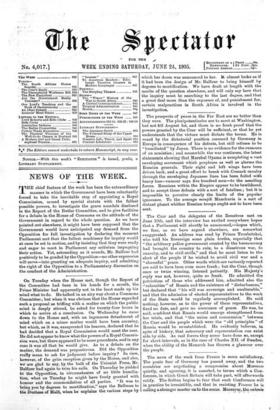The Czar and the delegates of the Zemstvos met on
June 19th, and the interview has excited everywhere hopes that a Parliament will shortly be summoned,—hopes which, we fear, as we have argued elsewhere, are somewhat exaggerated. An address was read by Prince Troubetzkoi, who told his Sovereign some plain truths, especially that " the arbitrary police government created by the bureaucracy had brought the country to ruin, to a disastrous war, to anarchy, and to civil strife," and that ho must listen to the elect of the people if he wished to avoid civil war and a "shameful" peace. Other words which are variously reported pre said to have been even more frank ; but the Czar, though once or twice wincing, listened patiently. His Majesty's reply was not, however, quite so frank. He admitted the patriotism of those who addressed him, admitted also the
calamities " of Russia and the existence of " disturbances," but declared that " his will was sovereign and unalterable," and that the admission of elected representatives to the work of the State would be regularly accomplished. He said nothing, however, as to the power of these representatives, fixed no date, and gave no assurance of peace. He was, he said, confident that Russia would emerge strengthened from her trials, and that " the union and communion" between the Czar and the people which were the "old principles " of Russia would be re-established. He evidently believes, in spite of history, that autocracy and representation can exist side by side. As real forces they never have done so, except for short intervals, as in the case of Charles XII. of Sweden, when the ability of the Monarch has thrown a glamour over the people.


















































 Previous page
Previous page